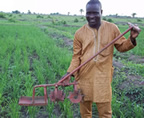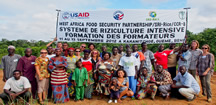Progress and Activities
2016 Updates
-
 Farmer-led study demonstrates benefits of SRI on Cropping Cycle[October 31, 2016] An article by Pascal Gbenou et al analyzes the results of 90 participating farmers who undertook SRI trials on 32 plots over 3 years beginning in 2009. In both plateau and floodplain environments, farmers compared conventional methods to SRI as well as ‘farmer-adapted’ practices (modified SRI using only the principle of early transplanting). The trials showed that SRI methods could increase average yields under farmer conditions by 54%, while reducing seed requirements by 87%. To achieve these benefits, however, required an increase in the amount of labor by 36 %. The findings also showed that under SRI practices, the crop cycle was shortened by 14 days. Significant differences in crop cycle duration among SRI (118 days), farmer-adapted methods (126 days), and conventional (132 days) suggest it is not only early transplanting, but the synergy of SRI practices that promote healthy root development and positively contribute to plant metabolism and growth. The authors note that shorter crop cycles “can reduce the risks related to hydro-climatic hazards… [and] can also diminish the crop’s exposure to pests and diseases.” [See full article in the European Scientific Journal for details.]
Farmer-led study demonstrates benefits of SRI on Cropping Cycle[October 31, 2016] An article by Pascal Gbenou et al analyzes the results of 90 participating farmers who undertook SRI trials on 32 plots over 3 years beginning in 2009. In both plateau and floodplain environments, farmers compared conventional methods to SRI as well as ‘farmer-adapted’ practices (modified SRI using only the principle of early transplanting). The trials showed that SRI methods could increase average yields under farmer conditions by 54%, while reducing seed requirements by 87%. To achieve these benefits, however, required an increase in the amount of labor by 36 %. The findings also showed that under SRI practices, the crop cycle was shortened by 14 days. Significant differences in crop cycle duration among SRI (118 days), farmer-adapted methods (126 days), and conventional (132 days) suggest it is not only early transplanting, but the synergy of SRI practices that promote healthy root development and positively contribute to plant metabolism and growth. The authors note that shorter crop cycles “can reduce the risks related to hydro-climatic hazards… [and] can also diminish the crop’s exposure to pests and diseases.” [See full article in the European Scientific Journal for details.]
 SRI-WAAPP Site Map UpdatedThe project on Improving and Scaling up the System of Rice Intensification (SRI) in West Africa (SRI-WAAPP) has had continued success promoting the introduction, adaptation and scaling up of SRI in Benin since January 2014. The updated 2016 map at right shows 62 SRI project sites throughout Benin. For more information on SRI in Benin, see the SRI-WAAPP project website and the SRI-WAAPP’s Benin page.
SRI-WAAPP Site Map UpdatedThe project on Improving and Scaling up the System of Rice Intensification (SRI) in West Africa (SRI-WAAPP) has had continued success promoting the introduction, adaptation and scaling up of SRI in Benin since January 2014. The updated 2016 map at right shows 62 SRI project sites throughout Benin. For more information on SRI in Benin, see the SRI-WAAPP project website and the SRI-WAAPP’s Benin page.
2015
 SRI-WAAPP Hosts Multi-Country SRI Youth Project[August 1, 2015 – December 31, 2015] As part of the SRI-WAAPP project, northern Beninese NGOs DÉDESC and DEDRAS, and WAAPP-Benin’s implementing agency, ProCAD (Programme Cadre d’Appui a la Diversification Agricole), organized a five month, four-country (Benin, Burkina Faso, Niger and Togo) SRI youth project (see final project report). Funded through both regional (through CNS-Riz) and national WAAPP (through ProCAD) structures, the project consisted of four primary components: a training of trainers held in Parakou / Bembèrèkè,
SRI-WAAPP Hosts Multi-Country SRI Youth Project[August 1, 2015 – December 31, 2015] As part of the SRI-WAAPP project, northern Beninese NGOs DÉDESC and DEDRAS, and WAAPP-Benin’s implementing agency, ProCAD (Programme Cadre d’Appui a la Diversification Agricole), organized a five month, four-country (Benin, Burkina Faso, Niger and Togo) SRI youth project (see final project report). Funded through both regional (through CNS-Riz) and national WAAPP (through ProCAD) structures, the project consisted of four primary components: a training of trainers held in Parakou / Bembèrèkè,  Benin (see training report); 12 field demonstration trials in the Tchaourou and Bembèrèkè communes in northern Benin; an exchange visit to two sites – Kaki-koka (Tchaourou), and Warandabou (Bembèrèkè) (see the exchange visit report); and an award and recognition ceremony for participants (awards were given for: demonstration plot management; innovation, in particular regarding water management; team spirit; and communication and sharing of information / data).
Benin (see training report); 12 field demonstration trials in the Tchaourou and Bembèrèkè communes in northern Benin; an exchange visit to two sites – Kaki-koka (Tchaourou), and Warandabou (Bembèrèkè) (see the exchange visit report); and an award and recognition ceremony for participants (awards were given for: demonstration plot management; innovation, in particular regarding water management; team spirit; and communication and sharing of information / data).
The project encountered difficulties with abnormal rainfall patterns; despite this, most trials were successfully executed, though many farmers had to find supplemental irrigation. Average yields across all trials were 6.28 t/ha for SRI and 2.88 t/ha for conventional production. The high yields for SRI were 15.5 t/ha (with full water control) in Warandabou, versus 7.5 t/ha for conventional production (also at Warandabou). Excluding the results from Warandabou, the average yields for SRI were 3.98 t/ha and 1.73 t/ha for conventional production. Average net revenue for the SRI plots was 595,500 CFA per hectare, versus 288,500 CFA per hectare for conventional production.
 SRI Achieves Success in a Rice Innovation Platform in Southern Benin[October 23, 2015] In an interview published on the French-language news site acotonou.com, the president of the WAAPP-created rice innovation platform (IP) in the Ouémé-Plateau, noted that SRI is being successfully used in the IP to boost rice yields to 10-12 tons/hectare. IPs are being promoted throughout West Africa as a means of better integrating agricultural and animal production value chains. (See article for details.)
SRI Achieves Success in a Rice Innovation Platform in Southern Benin[October 23, 2015] In an interview published on the French-language news site acotonou.com, the president of the WAAPP-created rice innovation platform (IP) in the Ouémé-Plateau, noted that SRI is being successfully used in the IP to boost rice yields to 10-12 tons/hectare. IPs are being promoted throughout West Africa as a means of better integrating agricultural and animal production value chains. (See article for details.)
2014
 Efforts Underway to Train 5,000 farmers in Southern Benin’s Ouémé River Valley Begin[November 20, 2014] Following the August 2014 regional training and workshop in neighboring Togo, the Benin WAAPP host organization PROCAD held the first training on November 12-14, 2014, of an initiative designed to mainstream SRI in the important Ouémé River Valley in the southern part of the country. Sixty farmers participated
Efforts Underway to Train 5,000 farmers in Southern Benin’s Ouémé River Valley Begin[November 20, 2014] Following the August 2014 regional training and workshop in neighboring Togo, the Benin WAAPP host organization PROCAD held the first training on November 12-14, 2014, of an initiative designed to mainstream SRI in the important Ouémé River Valley in the southern part of the country. Sixty farmers participated in this event, which was led by Dr. Pascal Gbenou, founder of the SAIN training school (Solidarités Agricoles INtegrées), and Antonin Akiyoko, an SRI trainer frequently active in central and northern Benin with the NGO DEDRAS. Over the course of the next few years future trainings of trainers and relay trainings will extend SRI to an estimated 5,000 farmers in the area. (For more information, check the SRI-WAAPP website’s article or the full-length French language report).
in this event, which was led by Dr. Pascal Gbenou, founder of the SAIN training school (Solidarités Agricoles INtegrées), and Antonin Akiyoko, an SRI trainer frequently active in central and northern Benin with the NGO DEDRAS. Over the course of the next few years future trainings of trainers and relay trainings will extend SRI to an estimated 5,000 farmers in the area. (For more information, check the SRI-WAAPP website’s article or the full-length French language report). Pascal Gbenou Participates in SRI Workshop and 4th International Rice Congress in Thailand[November 4, 2014] Pascal Gbenou participated in several events held in Thailand during October, 2014, including the Workshop on Building Alliances for SRI and Agroecology, held October 27-28, and the 4th International Rice Congress, held October 28-31. His poster, Farmer Evaluation of the System of Rice Intensification and Conventional Rice Cultivation Methods in Benin, was co-authored by Noukpo Agossou, University of Calavi, and Marjolein Visser, Free University of Brussels.
Pascal Gbenou Participates in SRI Workshop and 4th International Rice Congress in Thailand[November 4, 2014] Pascal Gbenou participated in several events held in Thailand during October, 2014, including the Workshop on Building Alliances for SRI and Agroecology, held October 27-28, and the 4th International Rice Congress, held October 28-31. His poster, Farmer Evaluation of the System of Rice Intensification and Conventional Rice Cultivation Methods in Benin, was co-authored by Noukpo Agossou, University of Calavi, and Marjolein Visser, Free University of Brussels. Thirteen Countries Participate in Regional Workshop to Launch Major SRI Project[February 20, 2014] Sixty-four participants (right) from across West Africa came together from February 17-19, 2014, in Porto Novo, Benin, for a programming and methodology workshop as part of the new project “Improving and Scaling up of the System of Rice Intensification in West Africa.”
Thirteen Countries Participate in Regional Workshop to Launch Major SRI Project[February 20, 2014] Sixty-four participants (right) from across West Africa came together from February 17-19, 2014, in Porto Novo, Benin, for a programming and methodology workshop as part of the new project “Improving and Scaling up of the System of Rice Intensification in West Africa.” Part of the West Africa Agricultural Productivity Program (WAAPP), the project was designed and is being led by a collaborative team from SRI-Rice and Mali’s Institute d’Economie Rurale (IER), which under the WAAPP is designated as a National Center of Specialization in Rice.
Part of the West Africa Agricultural Productivity Program (WAAPP), the project was designed and is being led by a collaborative team from SRI-Rice and Mali’s Institute d’Economie Rurale (IER), which under the WAAPP is designated as a National Center of Specialization in Rice.
 Participants included national SRI focal points; national WAAPP coordinators and monitoring and evaluation experts; and SRI champions from each country. The novel structure of this project creates room for each of these groups of actors to work side-by-side in a mutually reinforcing manner. This workshop allowed each group of actors to better detail their roles vis-à-vis each other, and to collaborate on a national level to develop action plans for the coming year. Additionally, data collection tools and monitoring and evaluation protocols were reviewed and revised, with feedback elicited (at left) from all the actors present. (Click on photos to enlarge.)
Participants included national SRI focal points; national WAAPP coordinators and monitoring and evaluation experts; and SRI champions from each country. The novel structure of this project creates room for each of these groups of actors to work side-by-side in a mutually reinforcing manner. This workshop allowed each group of actors to better detail their roles vis-à-vis each other, and to collaborate on a national level to develop action plans for the coming year. Additionally, data collection tools and monitoring and evaluation protocols were reviewed and revised, with feedback elicited (at left) from all the actors present. (Click on photos to enlarge.) SRI Workshop Gets Government-sponsored SRI Project Underway[January 20, 2014] The Beninese National Agricultural Research Institute (INRAB) is coordinating an SRI project sponsored by the West Africa Agricultural Productivity Program (WAAPP) in Benin. A workshop on the project was organized by Cyriaque Akakpo, WAAPP focal point in Benin, on January 16-17, 2014, in Grand Popo, Benin.
SRI Workshop Gets Government-sponsored SRI Project Underway[January 20, 2014] The Beninese National Agricultural Research Institute (INRAB) is coordinating an SRI project sponsored by the West Africa Agricultural Productivity Program (WAAPP) in Benin. A workshop on the project was organized by Cyriaque Akakpo, WAAPP focal point in Benin, on January 16-17, 2014, in Grand Popo, Benin.
2013
 Thirteen Farmer Field Schools Set to Train Farmers in SRIIn 2013 USAID’s PADA project (Projet d’Appui à la Diversification Agricole), working in collaboration with CARDER (Centre Agricole Régional pour le Développement Rural), the Government of Benin’s extension service, plans to setup 13 Farmer Field Schools to train farmers in SRI. If all goes according to plan the number of FFS participating could increase, provided that new sites meet the minimum requirements for SRI. (see page 4 of the PADA report for details.)
Thirteen Farmer Field Schools Set to Train Farmers in SRIIn 2013 USAID’s PADA project (Projet d’Appui à la Diversification Agricole), working in collaboration with CARDER (Centre Agricole Régional pour le Développement Rural), the Government of Benin’s extension service, plans to setup 13 Farmer Field Schools to train farmers in SRI. If all goes according to plan the number of FFS participating could increase, provided that new sites meet the minimum requirements for SRI. (see page 4 of the PADA report for details.) SRI-Rice Participates in Peace Corps SRI Trainings in West Africa
SRI-Rice Participates in Peace Corps SRI Trainings in West Africa [November 19, 2013] The report is now available for the second of two SRI trainings for Peace Corps Volunteers and their counterparts in West Africa. The event took place on April 29 – May 1, 2013, in Kakanitchoé, Benin. Erika Styger, SRI-Rice Director of Programs, trained participants along with Devon Jenkins and Daniel Saidu. The report also contains recent updates about SRI activities undertaken by participants in the months after the training. (See item on previous Sept. 2012 training workshop.) Funding for the training was provided by the West Africa Food Security Partnership (WAFSP), and by the SRI International Network and Resources Center (SRI-Rice).
[November 19, 2013] The report is now available for the second of two SRI trainings for Peace Corps Volunteers and their counterparts in West Africa. The event took place on April 29 – May 1, 2013, in Kakanitchoé, Benin. Erika Styger, SRI-Rice Director of Programs, trained participants along with Devon Jenkins and Daniel Saidu. The report also contains recent updates about SRI activities undertaken by participants in the months after the training. (See item on previous Sept. 2012 training workshop.) Funding for the training was provided by the West Africa Food Security Partnership (WAFSP), and by the SRI International Network and Resources Center (SRI-Rice). The NGO DEDRAS Trains Farmers in Northern Benin[July 15, 2013] The NGO Développement Durable, le Renforcement et l’Autopromotion des Structures Communautaires (ONG DEDRAS), through the two projects (Projet d’Appui à la Gestion Durable de la Sécurité Alimentaire in the commune of Banikoara [PAGDSA] and Projet pour la Sécurité Alimentaire et Nutritionnelle
The NGO DEDRAS Trains Farmers in Northern Benin[July 15, 2013] The NGO Développement Durable, le Renforcement et l’Autopromotion des Structures Communautaires (ONG DEDRAS), through the two projects (Projet d’Appui à la Gestion Durable de la Sécurité Alimentaire in the commune of Banikoara [PAGDSA] and Projet pour la Sécurité Alimentaire et Nutritionnelle [PROSA]), organized SRI trainings for four communes and 21 villages in northern Benin. Antonin Akiyoko (right), who learned about SRI at a recent W. Africa Peace Corps training in Kakanitchoé, led trainings that were held in the four villages (Dèguè, Simpérou, Tintinmou, Sirarou). Six technicians and 160 farmers received instruction over a 13-day period in May and June, 2013. Follow up plans include collecting information on farmer adaptations and preparation of an SRI technical guide for northern Benin. The farmers have also suggested a regional network and yearly farm school trainings in the three sub-regions.
[PROSA]), organized SRI trainings for four communes and 21 villages in northern Benin. Antonin Akiyoko (right), who learned about SRI at a recent W. Africa Peace Corps training in Kakanitchoé, led trainings that were held in the four villages (Dèguè, Simpérou, Tintinmou, Sirarou). Six technicians and 160 farmers received instruction over a 13-day period in May and June, 2013. Follow up plans include collecting information on farmer adaptations and preparation of an SRI technical guide for northern Benin. The farmers have also suggested a regional network and yearly farm school trainings in the three sub-regions. New Project to Train Farmers Underway in Central Benin’s Commune of Tchaourou[July 10, 2013] Lionel Ayedegue, who works for the Ministry of Agriculture, Livestock and Fisheries (MAEP), recently received funding for a one-season SRI project (June to December 2013) to improve rice productivity through the extension of SRI for lowland rice areas in the Commune of Tchaourou. The project will train 75 farmers (25 women, 40 men) in SRI and put in place demonstration plots in the villages of Kaki-Koka, Sanson, Kika I, Beterou, in the Commune of Tchaourou, Department of Borgou in Central Benin. (See report.)
New Project to Train Farmers Underway in Central Benin’s Commune of Tchaourou[July 10, 2013] Lionel Ayedegue, who works for the Ministry of Agriculture, Livestock and Fisheries (MAEP), recently received funding for a one-season SRI project (June to December 2013) to improve rice productivity through the extension of SRI for lowland rice areas in the Commune of Tchaourou. The project will train 75 farmers (25 women, 40 men) in SRI and put in place demonstration plots in the villages of Kaki-Koka, Sanson, Kika I, Beterou, in the Commune of Tchaourou, Department of Borgou in Central Benin. (See report.)
2009-2012
 Pascal Gbenou Discusses Development of SRI in Benin at Cornell University Event
Pascal Gbenou Discusses Development of SRI in Benin at Cornell University Event [October 30, 2012] While visiting the SRI-Rice Center at Cornell University in Ithaca, New York, Pascal Gbenou presented a seminar on SRI in Benin on October 23 (see PowerPoint presentation). Gbenou, who was the first farmer to grow rice in Benin with SRI methods, is president of the Consultative Council of Rice Producers’ Organizations of West Africa (Cadre Regional de Concertation des Organizations de Producteurs de Riz de l’Afrique de l’Ouest, CRCOPR), and was the founder of the Consultative Council of Rice Farmers in Benin (Conseil de Concertation des Riziculteurs du Benin, CCRB).
[October 30, 2012] While visiting the SRI-Rice Center at Cornell University in Ithaca, New York, Pascal Gbenou presented a seminar on SRI in Benin on October 23 (see PowerPoint presentation). Gbenou, who was the first farmer to grow rice in Benin with SRI methods, is president of the Consultative Council of Rice Producers’ Organizations of West Africa (Cadre Regional de Concertation des Organizations de Producteurs de Riz de l’Afrique de l’Ouest, CRCOPR), and was the founder of the Consultative Council of Rice Farmers in Benin (Conseil de Concertation des Riziculteurs du Benin, CCRB).
During the seminar, he discussed his PhD research on SRI at the University of Abomey Calavi, the spread of SRI in Benin, and his experiences at the Solidarité Agricole Integrée (SAIN) teaching farmer and research center he runs in Kakanitchoé, Ouémé. Gbenou also noted the importance of weeders in alleviating labor constraints. In order to make them available to farmers in Benin, he brought weeders from Mali and Burkina Faso to Benin and, together with local NGOs, is currently investigating how to replicate them at an affordable cost for Benin farmers (see photo at left).

 SRI Workshop in Ouémé, Benin, Attracts Participants from Four West African CountriesA three-day workshop was held in early September 2012 in Ouémé, Benin, to introduce the System of Rice Intensification to attendees from several West African countries and to train them in carrying out the new method of rice production. The event was a collaboration between the West Africa Food Security Partnership, SRI-Rice at Cornell University, and the Conseil de Concertation des Riziculteurs du Benin (CCR-B), and was hosted at the Solidarité Agricole Integrée (SAIN) teaching farmer and research center in Kakanitchoé, Ouémé.
SRI Workshop in Ouémé, Benin, Attracts Participants from Four West African CountriesA three-day workshop was held in early September 2012 in Ouémé, Benin, to introduce the System of Rice Intensification to attendees from several West African countries and to train them in carrying out the new method of rice production. The event was a collaboration between the West Africa Food Security Partnership, SRI-Rice at Cornell University, and the Conseil de Concertation des Riziculteurs du Benin (CCR-B), and was hosted at the Solidarité Agricole Integrée (SAIN) teaching farmer and research center in Kakanitchoé, Ouémé.
Workshop participants (shown at right) included coordinators from the Songhai agricultural learning and production centers in Benin, members of the Master Farmers Program in Senegal, and Peace Crops volunteers and their counterparts from Benin, Guinea, and Togo. (See report for details.)
 SRI Progress in Benin Noted at July 2012 West Africa SRI Workshop in Burkina FasoInformation on SRI in Benin was presented at a Regional Workshop on System of Rice Intensification of (SRI), which was held in Ouagadougou, Burkina Faso, on July 26 and 27, 2012. The workshop was organized by the West and Central African Council for Agricultural Research and Development (CORAF/WECARD), the National Center of Specialization for Rice (NCOS Mali) and SRI-Rice (Cornell University) within the framework of the West Africa Agricultural Productivity Program (WAAPP). Oxfam America sponsored participation for civil society representatives.
SRI Progress in Benin Noted at July 2012 West Africa SRI Workshop in Burkina FasoInformation on SRI in Benin was presented at a Regional Workshop on System of Rice Intensification of (SRI), which was held in Ouagadougou, Burkina Faso, on July 26 and 27, 2012. The workshop was organized by the West and Central African Council for Agricultural Research and Development (CORAF/WECARD), the National Center of Specialization for Rice (NCOS Mali) and SRI-Rice (Cornell University) within the framework of the West Africa Agricultural Productivity Program (WAAPP). Oxfam America sponsored participation for civil society representatives.
The PowerPoint presentation at the SRI workshop referred to two experimental areas Benin: 1) Ouémé (launched by the school farm SAIN) in 2009 in collaboration with the organization of rice farmers in the area and 2) Zou-Collines, which included fertilizer use, was planted with the support of IFDC.
In Ouémé, SRI seedling ages were 7-8 days, planted singly with 25×25 cm spacing, and with completely organic fertilization. Upland yields (from 17 parcels) ranged from 5.76 to 9.83 tons/ha, and as high as 11.02 tons/ha with composted poultry and rabbit manure; while floodplain yields ranged from 6.4 to 11.3 tons/ha. A video interview of Daniel Ah Messe, a farmer carrying out SRI in Dogba, Benin, was made during the Burkina Faso Workshop. (Photos of visits to farmers’ fields in Ouémé and elsewhere are shown in the embedded slideshow at right).
 USAID’s E-ATP Project Completes SRI Training in BeninIn collaboration with USAID/Mali’s IICEM project, E-ATP helped disseminate SRI methods in several countries in West Africa. Training in Benin in FY 2012 for 43 trainers (including 11 women) of eight partner organizations: (1) the Conseil de concertation des riziculteurs du Bénin (CCR-B), (2) Entreprises Territoires et Développement (ETD) and its Entreprises de Services aux Organisations des Producteurs (ESOP-Bénin); (3) IFDC-Benin; (4) the Vredeseilanden Country Office NGO; (5) the Union Nationale des Riziculteurs du Bénin; (6) three Centres Régionals de Production Agricole ; 97) three agricultural chambers of Benin; and (8) the Périmètres Rizicoles de Malanville, Ségbana, et Karimama . Subsequent cascades reached 286 participants (including 72 women). (Information from page 44 or the USAID final report of the Agribusiness and Trade Promotion, Extended Agribusiness and Trade Promotion Projects.
USAID’s E-ATP Project Completes SRI Training in BeninIn collaboration with USAID/Mali’s IICEM project, E-ATP helped disseminate SRI methods in several countries in West Africa. Training in Benin in FY 2012 for 43 trainers (including 11 women) of eight partner organizations: (1) the Conseil de concertation des riziculteurs du Bénin (CCR-B), (2) Entreprises Territoires et Développement (ETD) and its Entreprises de Services aux Organisations des Producteurs (ESOP-Bénin); (3) IFDC-Benin; (4) the Vredeseilanden Country Office NGO; (5) the Union Nationale des Riziculteurs du Bénin; (6) three Centres Régionals de Production Agricole ; 97) three agricultural chambers of Benin; and (8) the Périmètres Rizicoles de Malanville, Ségbana, et Karimama . Subsequent cascades reached 286 participants (including 72 women). (Information from page 44 or the USAID final report of the Agribusiness and Trade Promotion, Extended Agribusiness and Trade Promotion Projects.
.
2002
 First SRI Trials in Benin Show Good ProspectsIn 2002, Ann Elyse Merrit, previously an intern with the NGO ECHO which had published an article on SRI in 2001, assisted a government agriculturalist in doing controlled trials. The SRI yield was 7.5 t/ha compared to 1.6 t/ha for traditional practice.
First SRI Trials in Benin Show Good ProspectsIn 2002, Ann Elyse Merrit, previously an intern with the NGO ECHO which had published an article on SRI in 2001, assisted a government agriculturalist in doing controlled trials. The SRI yield was 7.5 t/ha compared to 1.6 t/ha for traditional practice.
Reports and Articles
- Groupe de Presse Le MATINAL. 2018. ,Gaston Dossouhoui à propos des perspectives de l’économie béninoise:Le Bénin, une puissance agricole à l’horizon 2021. Le Matinal, December 20. [12 ha will be planted to SRI in GIZ-financed Prosol project.]
- Ayedegue, Lionel, Antonin Akiyoko, and Rachidatou Boukari. 2016. Rapport final du projet d’integration regional de vulgarisation et/ Adoption du Systeme de Riziculture Intensif (SRI) dan 4 pays WAAPP (Benin, Togo, Burkina-Faso et Niger). SRI-Rice website. (43p., 2.09MB pdf) [Final report for a regional extension project for adoption of the System of Rice Intensification (SRI) in Benin, Togo, Burkina Faso and Niger by the NGO DeDESC in Benin (French)]
- 2016. Atelier de lancement officiel et technique de la diffusion à grande échelle des technologies éprouvées : Une initiative noble pour dynamiser le conseil agricole au Bénin. Cotounou.com, October 15.
- Bilgo, Ablasse, Pibgnina Bazie and Sebastien Subsol. 2015. Fiche n°2 sur les techniques d’agriculture climato-intelligente : Diffusion du système de riziculture intensive pour l’amélioration de la production agricole au Sud Bénin. AGRHYMET website. [French; 4p. pdf]
- Ayedegue, Lionel, and Antonin Akiyoko. 2015. Rapport de l’atelier regional de formation des riziculteurs, Jeunes – champions et techniciens sur le Systeme de riziculture intensif (SRI). SRI-Rice website. September. (31p., 1.81MB pdf) [French language report of a regional training (for SRI champions and technicians from Benin, Togo, Burkina Faso and Niger) by the NGO DéDesc (Non-Governmental Organization for Sustainable Economic and Socio-Cultural Development.)]
- Akiyoko, Antonin O. 2014. Rapport de l’atelier de formation des producteurs pour la mise en place et la conduite des parcelles de demonstration sur le SRI dans la Vallée de l’Ouémé. (French language report of a training by ProCAD/WAAPP-Benin held in Dangbo, Benin, November 12-14, 2014).
- Ayedegue, Lionel O. 2014. Rapport de fin d’activité menee dans cadre FoReVa campagne 2013-2014. SRI-Rice website. January. [French language report on SRI project (June to December 2013) to improve rice productivity through the extension of SRI for lowland rice areas in the Commune of Tchaourou].
- Jenkins, Devon, Stephanie Tack, and Erika Styger. 2013. 2nd Peace Corps West Africa System of Rice Intensification (SRI) training of trainers – Kakanitchoé, Ouémé, Republic of Benin, April 29th – May 1st, 2013.SRI-Rice website. November 15. (19p., 3.12MB pdf) [Summary report of Peace Corps West Africa training and subsequent activities.]
- Jenkins, Devon, Stephanie Tack, and Erika Styger. 2013. System of Rice Intensification regional training 11-13 September, 2012 – Kakanitchoé, Ouémé, Rep. of Benin – summary report. SRI-Rice website. January. (26p., 1.19MB pdf)
- Akiyoko, Antonin O. 2013. Rapport de formation des riziculteurs sur le Systeme de Riziculture Intensive / Banikoara-N’Dali, Benin. DEDRAS-ONG. System of Rice Intensification website. (33p., 1.15MB pdf) [French language report on promotion of SRI in Banikoara, N’Dali, Borgou Department, Benin, by the Organisation pour le Développement Durable, le Renforcement et l’Auto-promotion des Structures communautaires. (DEDRAS-ONG)]
Research and Evaluations
- Gbenou, Pascal, Anne-Marie Mitchell, et al. 2016. Farmer evaluations of the System of Rice Intensification (SRI) compared with conventional rice production in Benin. European Scientific Journal 12(30): 280-296. [accessed October 31, 2016]
- Mitchell, Anne-Marie. 2016. Examination of improved weeding technologies with smallholder rice farmers in southern Benin, West Africa. Master of Professional Studies paper, Cornell Univeristy. (45 p., 1.15MB pdf).
- Farmer Evaluation of the System of Rice Intensification (SRI) and the Conventional Rice Cultivation in Benin.
Poster presentation by Pascal Gbenou at the 4th International Rice Congress, BITEC, Bangkok, Thailand, October 27-31, 2014. - Gbenou, Pascal. 2013. Evaluation participative du Système de Riziculture Intensive dans la basse vallée de l’Ouémé au Bénin. PhD dissertation, Université d’Abomey-Calavi (Benin). (213p., 4.01MB pdf)
Presentations
- Farmer Evaluation of the System of Rice Intensification (SRI) and the Conventional Rice Cultivation in Benin.
Poster presentation by Pascal Gbenou at the 4th International Rice Congress, BITEC, Bangkok, Thailand, October 27-31, 2014. - Le SRI au Bénin
Powerpoint presented at the West Africa Regional SRI Workshop, Ouagadougou, Burkina Faso, July 26-27, 2012. 7 slides. - Le SRI au Bénin
PowerPoint presented by Pascal Gbenou at the SRI Rice meeting at Cornell University, Ithaca, New York, October 23, 2012. 24 slides.
Videos
- 2016 (November 3). Film SRI DéDESC ONG – Bénin . 6:45 min. SRI-Rice channel, YouTube. (French)
- 2016 (November 3). SRI au Bénin – Agriculture Formation Systeme Riziculture Intensive (Parakou). 2:25 min. SRI-Rice channel, YouTube. (French)
- 2016 (November 3). SRI au Bénin – Visite d’Echange d’Experiences (Tchaourou, Bembereke). 2:07 min. SRI-Rice channel, YouTube.
- 2012 (August 23). First West Africa SRI Workshop, Ouagadougou, 8/26-27/12: Daniel Ah Messe (Benin) (French). 2:24 min. Produced by SRI-Rice. sricornell channel, YouTube.
[Comments (in French) by Daniel Ah Messe, SRI farmer from Dogba, Benin, while attending the First West Africa System of Rice Intensification (SRI) Workshop, Ouagadougou, Burkina Faso, July 26-27, 2012.]